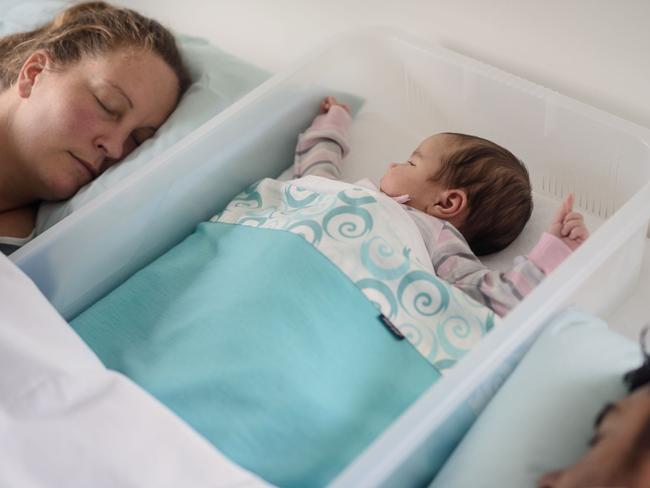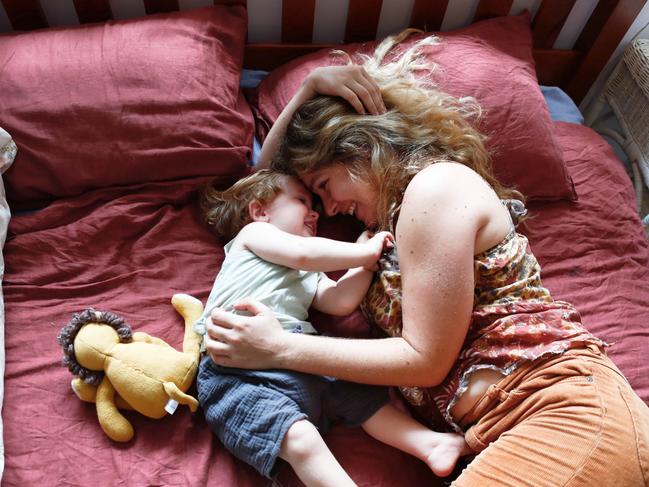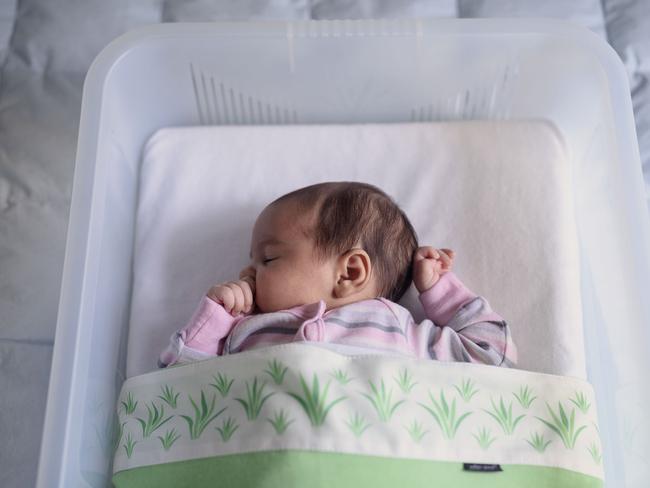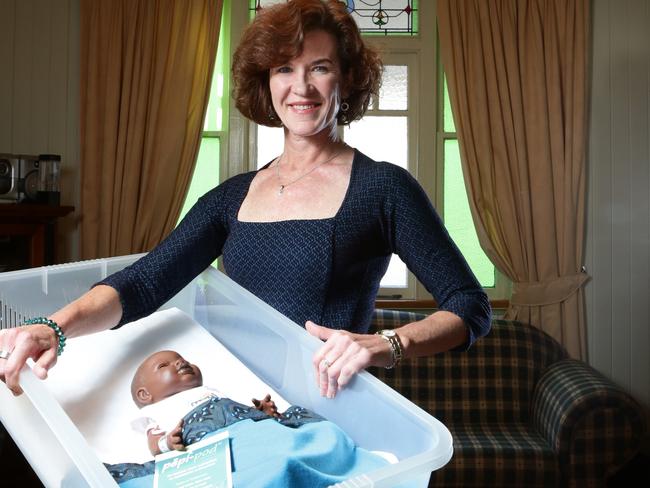NSW Health rules out Pepi-Pod device trialled across Australia
Co-sleeping with baby is a risk factor in sudden unexplained death in infancy, but parents are doing it regardless. Now a new device that allows baby to safely sleep with mum and dad is being trialled in Australia – but not in NSW.
NSW
Don't miss out on the headlines from NSW. Followed categories will be added to My News.
- Blood test that could identify babies at risk of SIDS
- No porky: Pigs now big business as therapy pets
Every state and territory in Australia, except NSW, is trialling a humble plastic box with links to a devastating earthquake which could dramatically reduce one of the most heartbreaking ways a baby can die.
The Pepi-Pod is an infant bed designed to safely let a baby sleep in the same bed as their parents and their implementation in New Zealand saw rates of sudden unexpected death in infancy (SUDI) drop by a third.
Co-sleeping and accidental suffocation is one of the highest risk factors in SUDI, but many parents let their baby sleep in their bed despite the warnings. Co-sleeping is also culturally common in many indigenous and ethnic communities.
Victoria and Queensland accept this reality and opt for harm minimisation strategies.
However in NSW, health authorities employ a total risk elimination philosophy and won’t actively investigate the Pepi-Pod.

The Pepi-Pod is a plastic, transparent plastic bassinet with a fitted mattress that can be placed on the parental bed. It was designed in New Zealand after the Christchurch earthquake left babies vulnerable to unsafe sleeping arrangement and since 2011 has resulted in a significant reduction in infant deaths.
Professor Jeanine Young from the University of the Sunshine Coast studied over 3500 parents and found a large number were co-sleeping, despite being advised not to.
MORE FROM JANE HANSEN
Drug that stops breast cancer’s spread now on PBS
‘Children will die’: Meningococcal B vaccine rejected
“The study showed 75 per cent in 2017 had brought baby into bed at some point in the first three months of life, so it is very common and around 20 per cent were parents who routinely brought their baby into bed several times a week,” Prof Young said.

“It has had tremendous success in New Zealand where they have seen a reduction in deaths by 36 per cent since 2011.
“Many babies are brought into bed to breastfeed and mums might may not intend to fall asleep with them in bed but then they will. They have created a safe environment in the cot but they haven’t done the same thing in the bed because they didn’t intend to, but if they know it is likely they will fall asleep, how do we say don’t even co-sleep, how do we ensure that a safe sleep environment if you chose to or don’t have any option but to co-sleep.”
Mums like Leah Burgess from Ocean Shores, near Byron Bay, who set up a cot in the bedroom, but ended up co-sleeping with baby Ethan.
Her partner sleeps in another room to minimise risk.
“I know it’s not best practice, but I just really struggled putting him down. He would fall asleep breast feeding and I was so tired and we both fall asleep. I’m from the Northern Rivers so I’d say 90 per cent of mums are co-sleeping,” the 37-year-old said.
“I would have been good if this was around and suggested to me it was good.”

Accepting the reality that parents co-sleep, Victoria and Queensland, and Red Nose, the charity for SUDI, formerly known as SIDS and Kids, are now giving tips on how parents can sleep with their baby with minimised risks.
“We have to take a risk minimisation approach, parents should be given information and educated to create safe sleep environments,” Prof Young said.
Head midwife for Red Nose, Jane Wiggill, said they would always first recommend sleeping baby in a cot next to the bed for first six to 12 months of life, which can lower the risk of SUDI, but have now added tips for co-sleeping more safely.
“The perspective Red Nose takes is a risk minimisation approach. We are not saying don’t do it, the safest way to sleep you baby is on its back in its own sleep space, but if you co-sleep this is how you can do it more safely.

“If we a have all these families doing it, Red Nose has responsibility to arm these parents to keep these children safe,” Ms Wiggill said.
But NSW Health opts for risk elimination and recommends no bed-sharing. Every state and territory in Australia is now trialling the Pepi-Pod except NSW.
According to the latest Child Death Review Team report, over the 15-year period to 2017, the NSW child death register classified 771 infant deaths as sudden and unexpected. While the rate of SUDI has declined over the past 15 years, the decline has plateaued and the rate has not changed significantly over the past decade.
“If we want to see a reduction in that last 15 per cent of infant deaths we need to management it differently and so risk minimisation is how we are going to do it,” Prof Young said.
A NSW Health spokeswoman said: “NSW is actively monitoring the outcomes of all trials of devices, like safe sleep pods, and will use this information to inform future decision making.”
